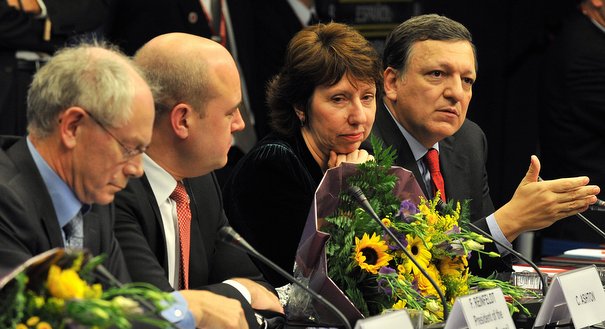That was some Sunday.
In Greece, extremist parties garnered so many votes that it will be difficult to form a stable government committed to following the EU’s rescue plan for the Euro.
In France, Socialist candidate Francois Hollande won, a man who made raising the income tax to 75 percent for the rich a central part of his platform. With that promise, he may even have won some of many votes that went to the extreme rightwing party of Marine Le Pen in the first round.
Populism seems to be on the rise everywhere. And support for these parties, the majority of which are right-wing, will continue to grow unless Europe’s leaders start practicing democracy in a radically new way.
The prevailing view is that the populist parties have gained such ground because of the euro crisis and the austerity measures that have been introduced in Greece and Spain, Italy, Portugal and Ireland.
But actually populist parties were on the advance – in Belgium, the Netherlands and France – long before the global financial crisis of 2008-2009 hit the continent.
Populists blamed EU enlargement, claiming that people from Eastern and Central Europe were ‘stealing’ jobs because of their low wages.
Then they jumped on the band-wagon of Islamophobia, warning of dire consequences to Europe’s identity and culture if Turkey was admitted to the EU.
More recently, they have intensified their calls for tighter immigration rules for people from North Africa and the Middle East.
The anti-foreigner sentiments are running so high now in several EU countries that respectable parties have begun to talk about rebuilding borders, too. Outgoing French president Nicolas Sarkozy even found support in Berlin for his proposal to reintroduce national border controls at will.
This powerful populism, it is to be assumed, will not disappear quickly, even if and when Europe emerges from the euro crisis.
Responsible politicians need to address the fears behind the populists’ rise – the fear of losing your job, the fear of being overwhelmed by other religions and cultures, the fear of becoming a victim to crime – head-on.
But they can’t pander to the populists. The more someone like Sarkozy sounds like a right-wing demagogue himself, the more he legitimizes the extreme right-wing.
But there is something else, too. Populists can only thrive in a climate of political discontent. They live on people’s disappointment with those in power, on their sense of powerlessness and alienation.
And if populism in Europe nearly always seems to have an anti-European thrust, it is because the European Union and its complicated institutions and decision making procedures are particularly distant from most people.
Is there any way this could be fixed?
EU experts and those who are the most passionate about European integration, suggest grand institutional reforms. The Commission, for starters, should be directly elected.
Others suggest that the European Parliament should be invested with more powers.
But would such reforms – even if they were politically feasible – really help to bring the Commission or the European Parliament lawmakers closer to the citizens? I’m not sure.
Instead, Brussels might find it worth trying for a different kind of communication with the people out there.
Jose Manuel Barroso and his commissioners should seriously consider road-shows and town hall meetings.
I am not talking about having a staged event where Barroso, surrounded by a phalanx of security guards, would address a select group of people behind closed doors.
No.
It is time that the EU’s leading representatives reach out to ordinary people.
The turgid press handouts and long-winded speeches that usually accompany EU events should be thrown away.
Barroso, the commissioners and the EU’s foreign policy chief, Catherine Ashton, need to take buses around Europe and stop in towns and cities to talk to audiences who have not been hand-picked. They need to really listen to what people want and think about Europe.
That means taking questions and risks. That means having a debate about what is it about Europe that drives populists to question the very existence of the EU. That means getting passionate about defending the greatest economic and political construction in Europe since 1945.
I mentioned this idea to a few EU civil servants and European parliamentarians.
Not one of them was enthusiastic.
Indeed, one German parliamentarian had the arrogance to suggest that there was little point in explaining how the EU worked and what it stood for because most Germans didn’t even know how the Bundesrat, (Germany’s upper house) worked! The view was that “we here in Brussels know what is best for Europe.”
Those who hold such views also have contempt for putting important issues directly to the vote by referendum.
When the Greek government last year suggested calling a referendum over the austerity package, there was an outcry from officials in Brussels and Berlin who saw their Euro rescue plan endangered. Under massive pressure, Greece abandoned the vote.
In Brussels, there was also scorn for Ireland’s decision to call a referendum over the EU’s fiscal pact. EU officials muttered that the issue was too complicated for citizens to decide. Besides, populists would hijack the agenda.
Yet surely that would be all the more reason for EU and national leaders to set the agenda and defend it.
We are living in an extraordinary era where the public has a wider access to information than ever before. This should work as a boon to democracy. It should strengthen transparency and accountability. It should allow citizens to have more of a say over important decisions.
After all, we are living in times when more and more countries in the world are embracing democracy, however difficult the transitions may be.
Surely it is incumbent on national and EU leaders to reach out to the citizens so as not to leave the field to populists.


-1.png)

-2.png)

.png)